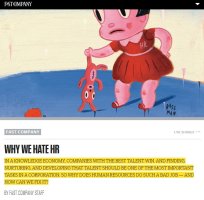
Why We Hate HR by Keith H. Hammonds

Read the summary below and get the key insights in just 10 minutes!

While the title of this article may or may not be tongue-in-cheek, Keith H. Hammonds makes some thought-provoking arguments about the role human resource (HR) officers should be playing at their companies. Employees are often unhappy with their company’s HR department. Instead of being strategic partners in their employers’ businesses and supporting talented employees, HR professionals concentrate on purely administrative tasks. But is that really their job description or, as Hammond suggests, are they just not qualified to do more? getAbstract recommends this sobering yet fascinating analysis to anyone working in the field of human resources.
[/text_block]

- What human resource (HR) departments do and don’t do,
- Why HR needs to change, and
- What challenges HR may face when attempting to transform.

Picture this: Las Vegas, Caesars Palace and hundreds of midlevel human resource (HR) executives mingling at a “strategic HR leadership” conference. After a presentation from Wells Fargo Home Mortgage senior vice president of human resources Julie Muckler, titled “From Technicians to Consultants: How to Transform Your HR Staff into Strategic Business Partners,” the audience appears slightly “dazed.” And that, precisely, is the problem with HR. When it comes to the straightforward administrative tasks of dealing with wages and benefits, a role that is increasingly being outsourced to save money, HR is competent. The more valuable role that is left over – developing human capital – is where HR performs poorly. There are four reasons for this:
“There are three questions that any decent HR person in the world should be able to answer. First, who is your company’s core customer?…Second, who is the competition?…And most important, who are we?”
HR people “pursue standardization and uniformity in the face of a workforce that is heterogeneous and complex.”
- HR professionals are ill-equipped – Most professionals don’t consider HR their first career choice. Largely, people who come into the HR game have given other career paths a try. Furthermore, an increasing number of HR professionals don’t have higher education beyond a bachelor’s degree and aren’t business savvy.
- HR focuses on the wrong things – HR concentrates on efficiency, because it is easy to measure. It worries about filling positions and doing activities, but rarely thinks about outcomes and the value of employees. HR doesn’t have a way to measure return of investment directly. Instead, companies like Cardinal Health choose to measure employee engagement indirectly through surveys and then correlate the results to the firm’s earnings to get an idea about the value of its employees.
- HR works for companies, not employees – With increasingly rigid labor regulations, companies use HR to protect themselves. To keep things in order, HR strives for uniformity because it is easy. Paradoxically, often the best employees are those who think outside the box; they should be rewarded, not punished.
- HR and management are disconnected – There is a lack of communication and understanding between HR and top management. HR professionals need to be strategic thinkers involved in the decision-making processes of their companies. But as long as HR professionals don’t try to break the mold, they will be stuck doing administrative work.
[/text_block]

Keith H. Hammonds is president and COO at Solutions Journalism Network and was Fast Company’s executive editor between 1999 and 2007.
[/text_block]

Get key insights from 15,000+ non-fiction books at GetAbstract.com.
[/text_block]




